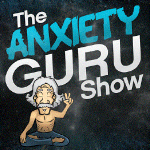
Today I want to introduce you to a single concept. It’s called externalization. In my view, learning externalization techniques can set you on a new path. One that leads far, far away from high anxiety. See, when you have really bad anxiety it’s common to assume that you and your anxiety are one and the same. For example, people often say things like “I’m such an anxious person.” If this is the narrative that you have adopted then over time it becomes hard to tell where you start and where anxiety ends. It makes anxiety feel embedded. This is called internalization. This can apply to values and attitudes adopted from other people as well, but it can definitely apply to anxiety and the belief system that you have built up around it.
This idea is easier to grasp if you think of anxiety as a thing. An object that pushes and pulls – something outside of you. The object of anxiety often sneaks up on you because for the most part its development is a product of unconscious mental processes. Nonetheless, once you have adopted a specific narrative regarding your anxiety, you literally create an entire problem saturated world. You carry this world in your head and it informs much of what you think and feel on a daily basis. It is powerful. But what would happen if you changed the narrative? Taking it a step further, what if you could separate yourself from anxiety. How would that change the way you think about your symptoms and fears?
So, listen now.
In this episode of The Anxiety Guru Show you’ll hear about:
- 3 genius ways to externalize your anxiety
- How to find help with the externalization process
- The role of language in high anxiety
- The pros and cons of adopting a new personal narrative
To listen, you can click the play button below or visit the AG iTunes page.
Want to support the show? Learn more here.





I am a retired therapist. For the last several years I have sent my anxious clients to your podcasts. Keep up the good work.
Thank you Lorne. I appreciate the vote of confidence.
Great podcast, thanks for all you do
Your podcast has helped me enormously and I am very grateful. I have become 90% myself again (still working on that last 10%) without meds thanks in large part to you. THANK YOU!
Hey Rachel,
Thank you for letting me know that the show has helped you. I hope you complete that last 10% soon!
Thanks so much Paul. Keep up the good work! This was the exact podcast I needed. Most of my acute anxiety symptoms are gone but I have had a hard time separating myself from the anxiety. Like anxiety is not me- it’s a thing. You mentioned good online resources for this. Do you have any good link? Thanks again Paul! You help MANY people!
Paul, Thank you so much for all the help and assistance you provide to everyone. I know, myself, how valuable it continues to be. A thank you comment seems to be a rather insignificant thing considering the time and effort that you put into your podcasts and your blogs, but know that your contributions are very significant to so many people.
Hi Paul,
I just wanted to reconfirmed what you already know…sharing your story, your anxiety experience with a client, in my opinion, in crucially important. Having been in the client couch before it is extremely comforting to hear that the person I am talking to can relate and understands completely what I am going through. So keep sharing, it really helps!
Thanks Maria, I totally agree. Having both perspectives helps a lot.
Hi. This is excellent and really helpful. Found your podcast after my therapist mentioned internalised anxiety. The “I am a virus person” stuff was a lightbulb moment! And I find it’s great to write things down in general as well as the methods you mention. All the best!